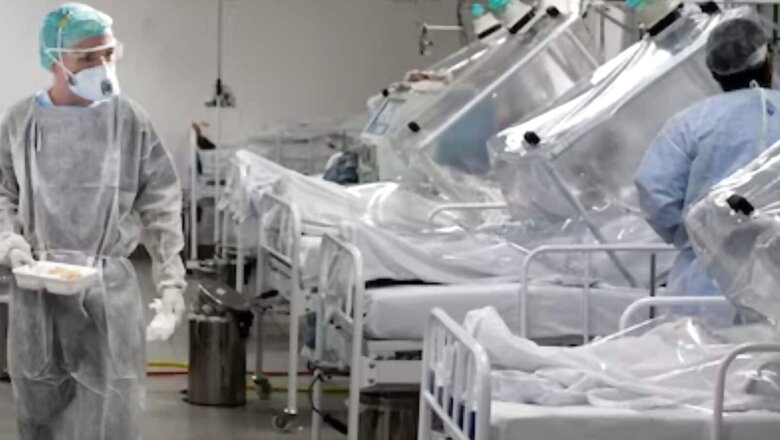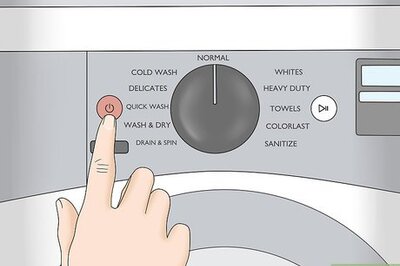World Mental Health Day | 'She Held My Hand, Asked if She'd Die’: Doctors Recount Covid Horror Story

views
“She held my hand and asked if she was going to die," said Dr Yatin Mehta, chairman, Institute of Critical Care and Anaesthesiology at Medanta, Gurugram, recalling the time he treated his friend’s wife during the second wave of Covid-19. “I did not know what to say because I knew she might not survive. And she did not."
In fact, Mehta said, “At one point, I was treating nine patients in Covid ICU and all were either close friends or wives of my close friends."
“Half of them died," he said, in a disappointed tone. “Such memories are very upsetting. I just managed to live through them, but there are many others who I referred for psychiatric counselling."
“Several healthcare workers suffered post-traumatic stress disorder (PTSD) – a mental health condition triggered after witnessing a terrifying event," Mehta said. “I just wish we never have to go through such times again."
While Mehta managed to sail through, another young doctor who was a junior resident at a large public hospital is still undergoing psychotherapy. Six months ago, she was diagnosed with anxiety disorder. “I was put on anti-anxiety pills and psychotherapy to handle anxiety. While now I am free from drugs, I am still talking to my therapist."
She, who requested to mask her identity, prefers to call the second wave of Covid-19 a “horror story". “I still remember walking into the hospital and seeing a long queue of dead bodies lying in the corridor. The hospital was full of stench, something I still remember…," she said, adding that she broke down in front of her senior doctor and requested approval for her resignation letter.
“Whenever I go back to those days, I remember technicians whose hands were bruised because of opening oxygen cylinders, minute after minute… I remember the time the mortuary staffers told me that the hands or legs of dead bodies were coming out as the bodies were rotting in the hospital," she recalled with a heavy heart and dull tone.
These doctors fought and managed to emerge physically unscathed despite catching Covid-19 multiple times, but mentally, they withered.
Dr Aishwarya, a psychiatric counsellor for doctors at the All India Institute of Medical Science (AIIMS), New Delhi, speaks to such drained healthcare workers on a daily basis. “Even when the second wave was going on, I found a lot of doctors experiencing grief, but they had no time to sit with these feelings."
I remember when one of the doctors told me what hit him hard. “He said when he went for rounds, he would find a new patient admitted in the ICU, while the older one had passed away. Every time, he saw a new patient, the feeling of grief hit him harder and harder… It was as if somebody just flipped the page of a book," Aishwarya said. “I experienced the dread of seeing ambulances everywhere on my 30-minute journey from Gurgaon to AIIMS."
A doctor, who was put on Covid duty in AIIMS, New Delhi, shared an incident which he said will always haunt him. “A pregnant women, who was Covid positive, died after delivering her dead child. The baby was Covid negative and we tried to hand over the body of the child to the family for cremation. But no one came forward, despite our wait for relatives for over a week. This, for some reason, shook me badly. I still can’t forget the face of child and his mother."
DEPRESSION, ANXIETY, FEAR AND STRESS
Studies have documented how the Covid-19 pandemic led to unprecedented levels of psychological problems, including depression, anxiety, fear, and stress, among frontline medical professionals. Resident doctors, the main healthcare workforce dealing with the Covid-19 pandemic, bore the brunt of the psychological and emotional consequences of the pandemic due to being mobilised to work in high‑risk setups with constant exposure to patients with Covid‑19, and having to constantly face ethical dilemmas.
A study conducted among the resident doctors in Amrita Hospital, Kochi, found a large proportion of resident doctors with depression, anxiety, and fear of Covid‑19. Individuals with higher levels of resilience and perceived social support had lower levels of depression, anxiety and fear of COVID‑19.
It observed that depression and anxiety were reported in 69% and 59.5% of the respondents, respectively. Individuals who had high levels of resilience were found to have significantly lower depression and anxiety levels. In this study, medical professionals with higher perceived social support were noted to have significantly lower levels of anxiety and depression.
COVID-19: TOUGHEST TIME FOR HEALTHCARE WORKERS
According to Dr Dipu TS, infectious diseases specialist at Amrita Hospital, Kochi, Kerala, the stressors during the Covid times were many.
For instance: Extended hours of work were never new to healthcare professionals, but work without food/water and using washrooms was exhausting, to say the least.
“Social phobia was at a different level, especially during the early days of the pandemic, prior to the vaccination and that’s the time when many healthcare professionals find it extremely difficult to manage their social life and professional life. We just had to pray every day that we won’t be the person who carries the virus from our patients to parents."
Initially, the doctors and other healthcare staff were struggling with ‘fear psychosis’, where no one knew what the novel coronavirus or its treatment was.
“For instance, one colleague of mine caught Covid-19 four times. For the second time, he got admitted to ICU for a week and faced several physical repercussions of the severe Covid attack, followed by another two rounds of infections," Mehta from Medanta said.
For junior resident doctors, Dr Dipu analysed, the situation was frightening beyond the virus, as their carriers were about to be destroyed. “It didn’t matter what they signed up for — orthopaedics or gynaecology or dentistry or skin — they ended up serving in Covid wards."
At the end of the day, experts suggest, that an individual’s psychological resilience, which includes coping well in the face of adversity and the ability to bounce back from difficult experiences, has emerged as an important factor in protecting mental health during the pandemic. Social support is another vital factor that promotes adaptive coping during stressful situations and reduces negative mental health outcomes.
HOW DID ORGANISATIONS HELP?
Fortis Healthcare has carried out several initiatives for the mental well-being of healthcare workers during the Covid-19 pandemic.
Dr Samir Parikh, director, mental health and behavioural sciences, explained that mental health experts conducted counselling sessions both online and on a walk-in basis for those who required support. “In addition, during the second wave of Covid-19, Fortis launched a very special initiative conducting online support groups three times a day, across the morning, afternoon and night, to make it easier for individuals to attend these sessions as per their schedules. This initiative ran for six weeks and was open to all, including nursing staff and support staff."
Parikh said that Fortis has recently started the “our well-being is our well-being initiative". “With this initiative, we are providing one-on-one counselling to employees across our hospital facilities."
According to Dr. Kathleen Anne Mathew, clinical assistant professor, of psychiatry and behaviour medicine at Amrita Hospitals, “interventions and training at an organisational level to enhance resilience are needed to equip medical professionals to handle global catastrophes like Covid-19".
Read all the Latest News India and Breaking News here




















Comments
0 comment